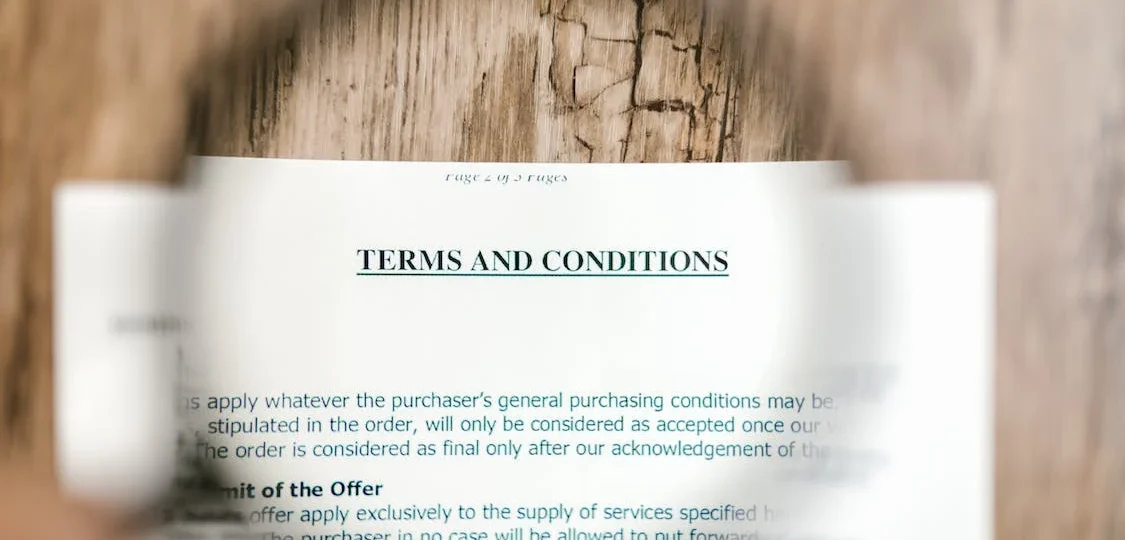
Business connections and their many moving parts are held together by contracts. They establish the limits of the parties’ mutual agreement and foster mutual respect and cooperation. Having solid Terms and Conditions (T&C), especially in sales, is like having a reliable guide in an unfamiliar legal landscape. In addition to protecting the company’s interests, properly formulated terms and conditions should make the respective roles and responsibilities of all parties very clear. This homepage details what happens if your terms and conditions have gaps, what your sales terms and conditions absolutely must have, and what to do if someone violates your terms and conditions.
Free 15-minute consultation for Business matters
with our Experience Lawyers.
Effects of Having Loopholes in your Terms and Conditions
The Terms and Conditions of a sales contract are not just mere formalities. They are the legal bulwark that stands between a business and potential disputes. Loopholes in these terms can render a business vulnerable to various adversities.
-
- Legal Disputes: Uncertainty or omissions in your T&C might give rise to lawsuits. The potential for misconceptions, which might lead to expensive legal fights, arises from the lack of clarity.
-
- Financial Losses: If your T&C include a flaw, it might be used by those with bad intentions to steal money from you. Damages to your bottom line might also occur from an unfavorable verdict in a dispute caused by such gaps.
-
- Reputational Damage: A company’s good name is one of its most precious resources. Flaws that lead to legal issues may damage a company’s reputation, turn off prospective consumers, and wear away at the faith of current clients.
-
- Operational Hiccups: Confusion in operational procedures might result from inconsistent or ambiguous T&C. Delays, confusion in the workplace, and tension with vendors and consumers are all possible outcomes.
Exposing the dangers that might arise from unprotected regions of your T&C is like shining a light on the places that need strengthening. This highlights the need of carefully writing your sales T&C to eliminate any room for legal or operational challenges.
5 Important Clauses Your Sales Terms and Conditions Should Include
The legal landscape may be difficult to navigate without a well written set of terms and conditions. These provisions serve as a map for the contractual relationship, providing direction and strength. If you want your sales terms and conditions to provide further legal protection and run more smoothly, consider including the following five provisions:
-
- Payment Terms: Payoff dates, accepted payment types, and late-payment penalties should all be spelled out in detail. Financial transactions will go more smoothly, and payment disputes will be reduced, as a result of this clarity.
-
- Delivery Terms: Explain when they will arrive, how they will be sent, and how much it will cost. The likelihood of misunderstandings is reduced when delivery terms are well specified and understood by both parties.
-
- Return and Refund Policy: Maintaining credibility and satisfying customers calls for a well-thought-out return and refund policy. It also lays forth a plan for how to process exchanges and refunds if they become necessary..
-
- Limitation of Liability: This provision is critical for limiting your company’s potential liability. It usually specifies the limits of your company’s responsibility in the case of a defective product, a delivery delay, or any other kind of misfortune.
-
- Dispute Resolution: The conflict resolution process (mediation, arbitration, or litigation) should be spelled forth in a separate clause. This provision may help facilitate peaceful settlements, which is good for maintaining business connections.
Investigating these provisions and modifying them to match the specifics of your company is a sensible first step in developing a robust sales T&C. The goal is to establish a solid foundation of law that can withstand the onslaught of legal challenges and operational gray areas.
How to Deal with Breaches or Violations of Your Terms and Conditions
When a company suffers a breach or violation, it may send shockwaves through the company’s finances and image. It is critical to have a plan in place for handling such situations. The following is a methodical plan for handling infractions or breaches of your Terms & Conditions:
-
- Identification and Documentation: The first step is identifying the breach and documenting it meticulously. This includes gathering all relevant communications, contracts, and evidence that substantiates the violation.
-
- Legal Consultation: Seek legal advice from a legal firm to understand the implications of the breach and the legal recourse available. A seasoned lawyer can provide insights on the potential outcomes and the best course of action.
-
- Communication with the Offending Party: Engage in a dialogue with the party in violation. Sometimes, misunderstandings or lack of clarity could be the root cause, and a constructive conversation could pave the way for resolution.
-
- Alternative Dispute Resolution (ADR): Explore avenues like mediation or arbitration to resolve the issue amicably. ADR can be a cost-effective and quicker way to resolve disputes compared to litigation.
-
- Legal Action: If all else fails, initiating legal action might be the necessary step. It’s imperative to have a robust legal strategy to navigate the complexities of the legal process.
Addressing breaches or violations in a structured and legally sound manner can mitigate the negative repercussions on your business. It reflects a level of preparedness and professionalism that not only resolves issues but also deters future violations.
Conclusion
Establishing clear Sales Terms and Conditions is analogous to writing the rules of the game in business. The goal is to create a setting where commercial transactions may flourish while being protected from legal prosecution. Businesses may lay the groundwork for efficient operations and long-lasting commercial partnerships by foreseeing the consequences of gaps, including crucial terms, and preparing for breaches. By taking the initiative to Sign a Contract, a company may strengthen its legal footing and, by extension, its reputation and dependability in the eyes of partners and consumers.

